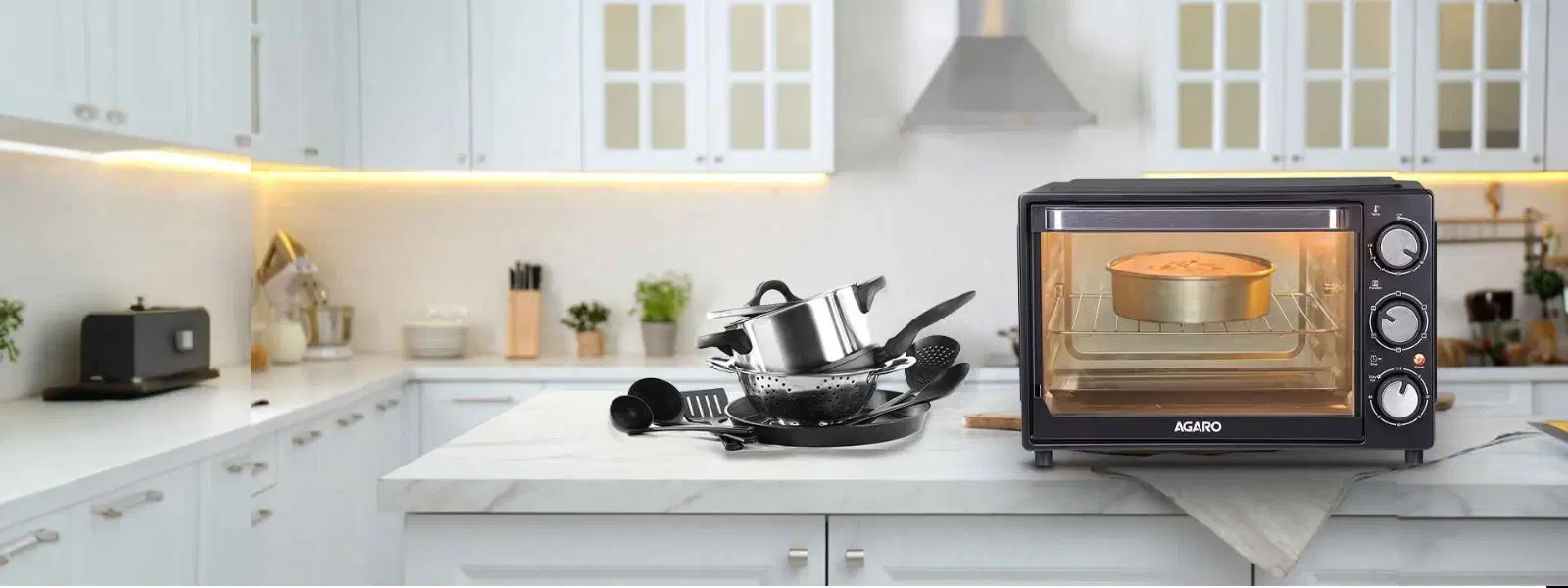
Home Appliances
•03 min read
You’re reheating leftovers and the only clean dish is a steel bowl. You might ask, can steel be used in microwave? Many of us face this dilemma, and understanding microwave safety is essential. In this post, we clarify the science behind microwave heating, examine whether using metal in microwave is safe, and share useful microwave cooking tips to keep your kitchen hazard-free.
Microwave ovens work by agitating water molecules in food to generate heat. This process makes materials like glass and ceramic ideal as they absorb the microwave energy without risk. In contrast, microwave safe materials differ from metals. Using metal in microwave, including steel, can lead to dangerous situations because metal objects in microwave reflect the energy rather than absorbing it.
Metals, such as steel, behave differently in microwaves. Instead of getting heated, they reflect the microwave radiation. This reflection may cause sparks, known as arcing, and lead to uneven heating. These effects of steel in microwave can damage the oven and create a fire hazard. Keeping kitchen safety microwave a priority is important for every household.
To answer the primary question: no, steel is generally not safe for use in microwaves. It reflects microwave radiation, which can cause dangerous sparking and even lead to fires in some circumstances.
That said, there are exceptions. Some steel items may be used if they are designed to be microwave safe and come with proper labels. In these rare cases, aspects such as the shape and thickness of the metal objects in microwave can make a difference. When in doubt, always opt for microwave compatible materials to ensure your safety and the longevity of your appliance.
For a safer microwave experience, consider using materials that are specifically designed for this purpose. Reliable choices include glass, ceramic, microwave-safe plastic, and silicone. Always check for the microwave-safe label on your containers.
A simple method to test if your dish or container is microwave safe is the “cup of water” test. Place the container in the microwave with a cup of water. If the container remains cool while the water heats up, it should be safe for microwave use.
Using steel in the microwave can lead to serious hazards. The reflective nature of steel can cause sparks and even fire. Sparks may also result in electromagnetic interference, disrupting the microwave's functionality and potentially causing long-term damage.
Many people believe that using small steel objects or foil in a microwave is harmless. However, even small amounts of steel can create issues. The risks associated with microwave hazards with steel are not to be taken lightly, as even brief exposure to metal can affect cooking performance.
Did You Know? The Science of Sparks
Did you know that the sparks caused by steel in a microwave occur because the metal reflects microwave radiation instead of absorbing it? This reflection, known as arcing, can damage your microwave’s interior and lead to a fire hazard. Always check your container for microwave compatibility.
For safe microwave cooking, follow these tips:
Avoid using metal utensils or objects unless they are explicitly designed for microwave safety.
Inspect containers for any cracks before use.
Never operate a microwave empty.
Following these microwave safety guidelines helps ensure that you avoid any potential harm and keeps your kitchen running smoothly.
Make your microwave experience both safe and effective by:
Using only verified microwave compatible materials.
Covering food with microwave-safe lids or wraps to avoid splatters.
Regularly checking the condition of your microwave and following the manufacturer’s instructions.
At Tata Neu, we offer a seamless shopping experience across home appliances and gadgets designed with advance technology. With features like Express Delivery available in selected locations for orders placed before 6pm, you can enjoy fast, hassle-free service. Plus, each purchase lets you earn NeuCoins, rewarding your loyalty in every transaction.
No, steel is generally not safe to use in a microwave because it reflects microwave radiation, causing sparks and potential fire hazards.
Steel is avoided in microwave ovens because it reflects microwaves instead of absorbing them. This reflection can lead to uneven heating, sparks, and even damage to the appliance.
Some microwave-safe metals, like aluminium foil, can be used in small, controlled amounts. However, they must be used in line with the manufacturer's guidelines due to the potential risks.
Materials such as glass, ceramic, microwave-safe plastic, and silicone are recommended. Always check for labels confirming the material's safety in microwaves.
No, stainless steel is not microwave-safe unless it has been explicitly labelled as such. It poses similar risks of sparking and damage as other steel items.
Understanding microwave safety is essential for every kitchen. While steel and most metals present hazards when used in a microwave, there is a wide range of microwave-safe materials that can meet your cooking needs. By following these guidelines and tips, you can safely harness the convenience of your microwave, ensuring both practicality and safety in your daily cooking. Enjoy the benefits like earning NeuCoins on Tata Neu while making smart, informed decisions for a safer and more efficient home.